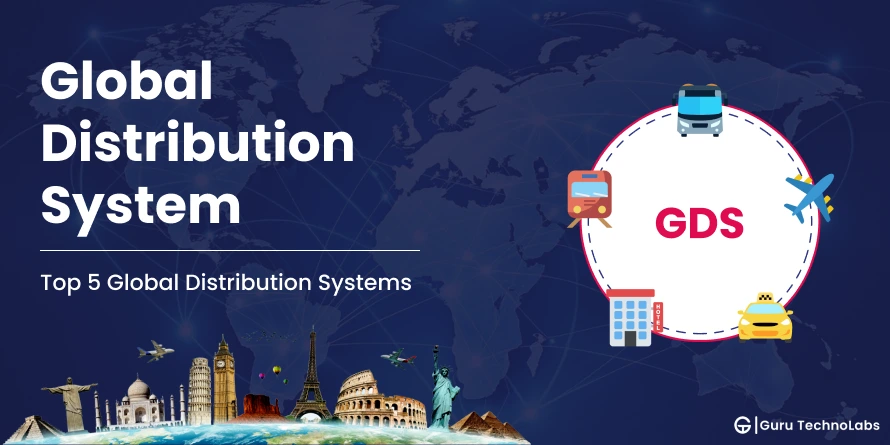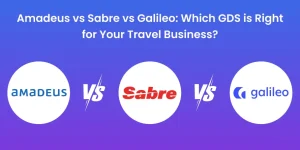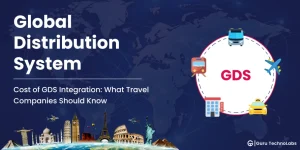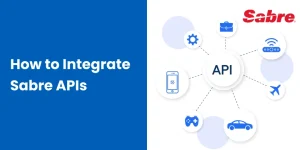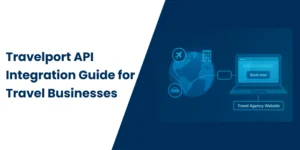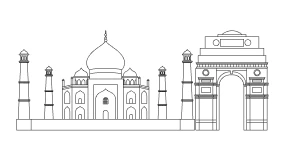Global Distribution Systems (GDS) are the invisible engines behind the travel industry’s seamless connectivity. From booking flights and hotels to car rentals and cruises, GDS platforms serve as the digital backbone that links travel agents with real-time inventory across the globe. Without GDS, the speed, scale, and efficiency of travel booking as we know it simply wouldn’t exist.
But exactly what is Global Distribution System, and how does GDS work to make travel so instant and interconnected? What are benefits and Types of GDS? These systems gather data from thousands of service providers and deliver it in a centralized interface, helping agencies and online platforms make instant, accurate reservations, all in a matter of seconds.
Whether you’re a travel tech enthusiast, an agency owner, or just curious about what powers global bookings, you’re in the right place. In this blog, we will explore the top GDS systems that are transforming the way the world travels. Let’s dive in!
The History of Global Distribution Systems (GDS)
The history of Global Distribution Systems (GDS) traces back to the mid-20th century, when airlines began seeking more efficient ways to manage reservations as air travel boomed.
Initially, bookings were handled manually with paper cards, but by the early 1960s, airlines like American Airlines, in partnership with IBM, developed computerized reservations systems such as SABRE, which could process thousands of bookings per hour and changed the industry.
The 1980s and 1990s saw the formal emergence and rapid expansion of GDSs, with major systems like SABRE, Amadeus (founded by Air France, Lufthansa, Iberia, and SAS in 1987), and Galileo (established by British Airways, KLM, and others) dominating the market.
These top GDS platforms evolved beyond flights to include hotels, car rentals, and other travel services, becoming central to global travel distribution. The rise of the internet in the 1990s further transformed GDSs, enabling online bookings and greater consumer access.
Today, GDSs remain vital to the travel industry, connecting service providers with agents and travelers globally, even as new technologies and distribution models continue to emerge.
What Are the Top 5 Global Distribution Systems (GDS)?
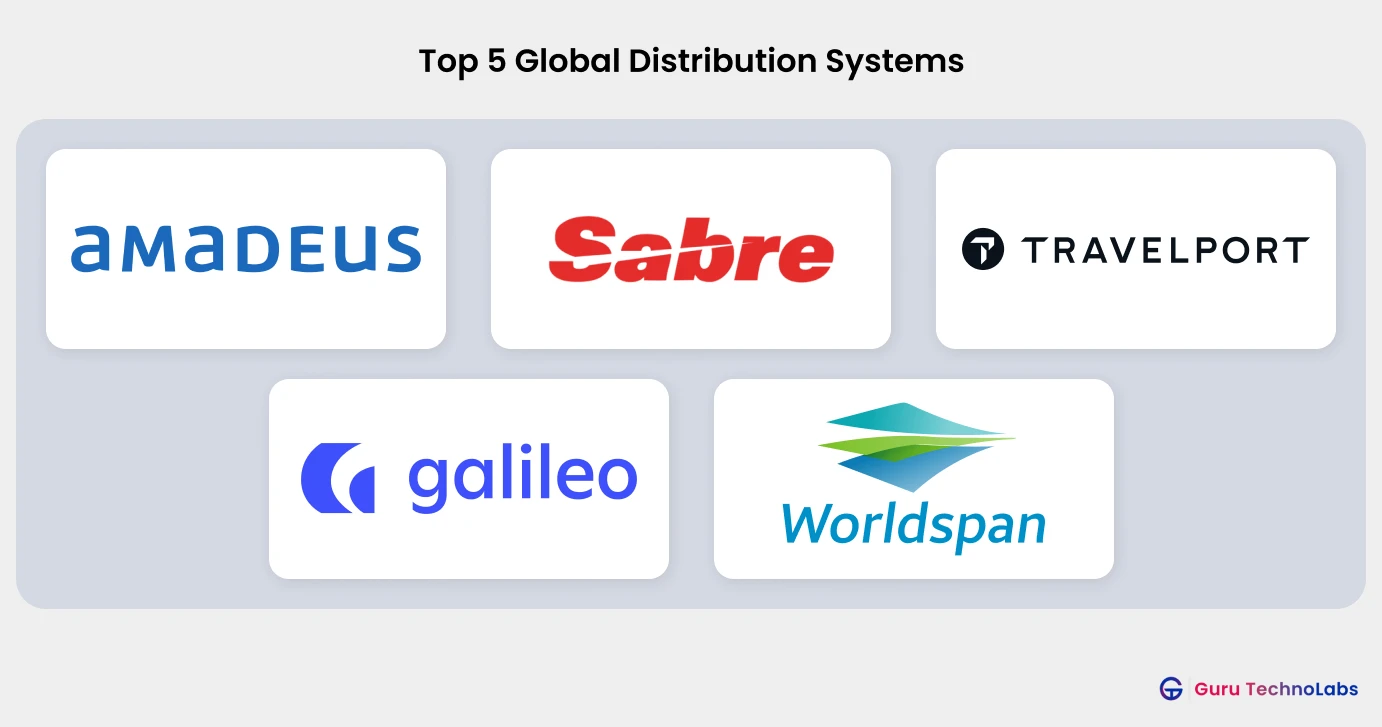
Global Distribution Systems (GDS) are the backbone of the travel industry, enabling seamless connectivity between travel service providers and agents globally. These platforms facilitate real-time bookings for flights, hotels, car rentals, and more. Let’s delve into the five best GDS systems that power global travel bookings.
1) Amadeus – The European Powerhouse
Amadeus is a global travel technology company headquartered in Madrid, Spain, and one of the most dominant GDS providers in the world. Founded in 1987 by a consortium of major European airlines, it was built to streamline and modernize airline booking processes. Amadeus one of the most well-established Airline GDS platforms in the industry.
Over the decades, Amadeus gds systems has expanded into hotels, rail, cruises, and even airport operations, making it a one-stop travel ecosystem. Its technology powers bookings in more than 190 countries, supporting millions of transactions daily. Known for innovation and scalability, Amadeus serves both travel suppliers and sellers with robust, cloud-based solutions.
Features
- Comprehensive travel content aggregation
- Advanced analytics and reporting tools
- Seamless integration with airline and hotel systems
- Cloud-based solutions for scalability and flexibility
Also Read: Features of GDS
Unique Aspect: Amadeus is renowned for its robust IT solutions, including the Altéa Customer Management System, which helps airlines manage reservations, inventory, and departure control systems.
2) SABRE
Sabre, based in Southlake, Texas, is one of the oldest and most influential GDS systems, launched in 1960 through a partnership between IBM and American Airlines. It was the first computerized reservation system and quickly evolved into a dominant player in travel distribution technology. Today, SABRE GDS System powers booking systems for travel agencies, OTAs, and large corporations around the world, handling billions of transactions annually.
With strong roots in North America and expanding global reach, Sabre supports not only flight reservations but also hotels, car rentals, cruises, and rail. Its focus on mobility, data, and automation keeps it at the forefront of travel tech innovation.
Sabre’s network encompasses approximately 400 airlines, 200,000 hotels, 50 rail carriers, 40 car rental outlets, and 17 cruise lines, making it a significant player in the global travel market.
Features
- Real-time booking and reservation capabilities
- Mobile and web-based solutions for travelers
- Data-driven insights and analytics
- Comprehensive travel management tools for agencies
Unique Aspect: Sabre is recognized for its pioneering role in online travel agencies, corporate booking tools, and mobile itinerary management, setting industry standards for travel technology.
3) Travelport – The Global Connector
Travelport is a UK-based GDS provider that operates a suite of platforms including Galileo, Worldspan, and Apollo. Though headquartered in Langley, Berkshire, it serves a strong user base in the USA and beyond, especially in hotel and rail bookings. Integration with Travelport GDS connects more than 650,000 hotel properties, 400+ airlines, 50 ferry/cruise companies, and nearly 20 rail operators globally.
Travelport is also widely recognized as a leading Hotel GDS and positions itself as a commerce platform, enabling real-time inventory access for travel sellers and offering cutting-edge API solutions. Its reputation for versatility and extensive content makes it an essential tool for modern travel businesses.
Features
- Diverse booking options for flights, hotels, and car rentals
- Efficient API integration for travel agencies
- Automated operational tools to enhance efficiency
- Real-time inventory updates and booking confirmation
Unique Aspect: Travelport’s comprehensive distribution services and flexible solutions make it a preferred choice for travel agencies seeking a wide range of travel content.
4) Galileo – The Legacy System
Galileo, a long-established GDS, originated in the 1970s and is now fully integrated under the Travelport umbrella. It has played a major role in shaping digital travel distribution, especially in Europe and Asia.
Travel agents and corporate travel managers continue to rely on Galileo for flight bookings, hotel reservations, and car rentals. Its capabilities as a Car rental GDS make it particularly valuable for agencies. The system supports a wide range of languages and currencies, making it accessible to users across global markets. Galileo remains a trusted platform for its reliability, legacy integrations, and broad reach in the travel supply chain.
Features
- Robust reservation and booking capabilities
- Well-researched travel aggregation
- Integration with various travel service providers
- Support for multiple languages and currencies
Unique Aspect: Galileo’s long-standing presence in the industry and its integration with Travelport’s systems ensure a seamless and reliable travel booking experience.
5) Worldspan – The Integrated Solution
Worldspan is another key GDS operated by Travelport, originally launched in the 1990s as a collaboration between Delta Air Lines, Northwest Airlines, and TWA. It was built to provide travel agencies and corporations with a unified platform for reservations and data management.
With its stronghold in North America, Worldspan has expanded its content to include thousands of airlines, hotels, and ground transport providers. It’s especially favoured for its seamless back-office integration and custom workflow capabilities. For businesses seeking both scale and flexibility, Worldspan offers a well-rounded solution.
Features
- Integrated reservations and back-office solutions
- Real-time booking and inventory management
- Support for multiple travel service providers
- Customizable solutions to meet specific business needs
Unique Aspect: Worldspan’s integrated approach allows travel agencies to streamline their operations, enhancing efficiency and service delivery.
Summary of Top 5 GDS Platforms
To help you quickly compare the best Global Distribution Systems (GDS) in the market, here’s a concise table outlining their key features, costs, and specialities. This will give you a clearer view of which GDS best fits your business needs.
| GDS Provider | Best For | Coverage & API Integration |
|---|---|---|
| Amadeus | Large OTAs, airlines, and global travel agencies | 435+ airlines, 280+ hotel chains, 103 rail operators, 29 car rental brands. Robust API for airlines, hotels, rail, and insurance services. |
| Sabre | North American travel tech companies, TMCs | 400+ airlines, 200K+ hotel properties, 40 car rentals, 50 rail carriers. Rich API support for bookings, analytics, and mobile apps. |
| Travelport | Full-service travel agencies & global hotel distribution | 650K+ hotel properties, 400+ airlines, 50 cruise/ferry lines, 19 railway carriers. APIs are available for flights, hotels, and car rentals. |
| Galileo | Mid-sized agencies and regional operators | Integrates with thousands of global providers; strong flight and hotel booking engine. API-ready for agency use. |
| Worldspan | Corporate booking tools & automation-focused users | Supports 430+ airlines, thousands of hotels, and transport services. Offers seamless API + back-office automation. |
Conclusion
In this guide, we’ve explored the 5 best Global Distribution Systems (GDS) that are shaping the future of the travel industry. Each platform Amadeus, Sabre, Travelport, Galileo, and Worldspan, offers unique advantages, from vast global inventories to seamless API integrations. While all of them bring powerful features to the table, they also come with their own set of strengths and limitations depending on your business model and target market.
If you’re entering the travel business or looking for GDS integration service with your existing system, making the right choice is critical to streamlining operations, increasing bookings, and staying competitive in a fast-paced digital landscape.
Need help choosing or integrating the right GDS for your platform? Contact us today to get expert guidance and custom solutions tailored to your travel business.
Frequently Asked Questions
Yes, even small and mid-sized travel agencies can use GDS platforms. Some GDSs offer scaled-down packages or partner programs that make them accessible without huge upfront costs.
GDS companies earn revenue through transaction fees charged to service providers (like airlines or hotels) and sometimes through licensing or access fees charged to agencies or OTAs.
Yes, all top GDS platforms offer robust API integrations that allow OTAs, travel portals, and agencies to connect directly to inventory and booking systems.
Amadeus is often considered the best GDS for travel agents due to its global reach, robust features, and support for flights, hotels, rail, and car rentals. Sabre is preferred in North America, while Travelport excels in hotel and multi-service bookings.
Travelport and Amadeus are top GDS options for hotel bookings. They provide access to hundreds of thousands of hotel properties with real-time availability, pricing, and integrated booking tools for agents and OTAs.
Popular GDS tools include:
- Amadeus Selling Platform
- Sabre Red 360
- Travelport Smartpoint
- Galileo Desktop
- Worldspan Go!
These tools help travel agents efficiently search, book, and manage reservations.
In the hospitality industry, a Global Distribution System (GDS) enables hotels to distribute room availability, rates, and inventory to travel agents, online travel agencies (OTAs), and corporate booking platforms worldwide with different hotel APIs. GDS helps hotels increase global visibility, attract high-value business travelers, maintain rate parity, and streamline bookings through centralized distribution channels.
Travel agents typically evaluate multi-GDS booking platforms based on how effectively they consolidate multiple GDS systems into a single workflow, support real-time ticketing, and provide access to broad airline and hotel inventory. Factors such as booking volume, agency specialization (group, student, or corporate travel), and scalability also play an important role.
